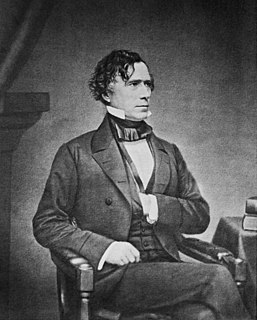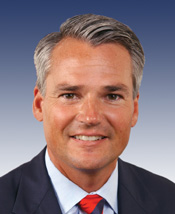A Quote by John H. Reagan
The success of those doctrines would also subvert the Federal Constitution, change the character of the Federal Government, and destroy our rights in respect to slavery.
Related Quotes
The tenth amendment said the federal government is supposed to only have powers that were explicitly given in the Constitution. I think the federal government's gone way beyond that. The Constitution never said that you could have a Federal Reserve that would have $2.8 trillion in assets. We've gotten out of control.
If we stuck to the Constitution as written, we would have: no federal meddling in our schools; no Federal Reserve; no U.S. membership in the UN; no gun control; and no foreign aid. We would have no welfare for big corporations, or the "poor"; no American troops in 100 foreign countries; no NAFTA, GAT, or "fast-track"; no arrogant federal judges usurping states rights; no attacks on private property; no income tax. We could get rid of most of the agencies, and most of the budget. The government would be small, frugal, and limited.
The proposed constitution, therefore, even when tested by the rules laid down by its antagonists, is, in strictness, neither a national nor a federal constitution; but a composition of both. In its foundation it is federal, not national; in the sources from which the ordinary powers of the government are drawn, it is partly federal, and partly national; in the operation of these powers, it is national, not federal; in the extent of them again, it is federal, not national; and finally, in the authoritative mode of introducing amendments, it is neither wholly federal, nor wholly national.
It [the Constitution] didn't break free from the essential constraints that were placed by the founding fathers in the Constitution, at least as it's been interpreted, and the Warren court interpreted it in the same way that generally the Constitution is a charter of negative liberties. It says what the states can't do to you, it says what the federal government can't do to you, but it doesn't say what the federal government or the state government must do on your behalf. And that hasn't shifted.
Constitutions are violated, and it would be absurd to expect the federal government to enforce the Constitution against itself. If the very federal judges the Constitution was partly intended to restrain were the ones exclusively charged with enforcing it, then "America possesses only the effigy of a Constitution." The states, the very constituents of the Union, had to do the enforcing.
Gorsuch, who is a U.S. Supreme Court nominee in the United States, said the real test of law is when a government can lose in its own courts and still respect the order. And I think Canadian need to ask is why would Canada, if it's doing everything right, why wouldn't you want to be watched? If they are contesting the fact that their own courts don't have jurisdiction over the government's human rights violations, then our next step is to go to federal court and find the federal government that can come to court and we will do that.
The constitutionality and propriety of the Federal Government assuming to enter into a novel and vast field of legislation, namely, that of providing for the care and support of all those ... who by any form of calamity become fit objects of public philanthropy. ... I cannot find any authority in the Constitution for making the Federal Government the great almoner of public charity throughout the United States. To do so would, in my judgment, be contrary to the letter and spirit of the Constitution and subversive of the whole theory upon which the Union of these States is founded.
[The Massachusetts constitution] resembles the federal Constitution of 1787 more closely than any of the other revolutionary state constitutions. It was also drawn up by a special convention, and it provided for popular ratification - practices that were followed by the drafters of the federal Constitution of 1787 and subsequent state constitution-makers.
We have reached a moment in our history where we think that every problem in America has to have a federal government solution. Every problem in America does not have a federal government solution. In fact, most problems in America do not have a federal government solution and many of them are created by the federal government to begin with.
Our government does not exist to decide the rights, nor to grant them. Our government exists to protect them. And that is why we have a constitution that limits the power of the federal government to a few specific, but important things and we have abandoned that. We have abandoned it in both political parties.






























